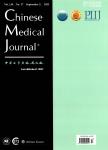Efficacy and safety of low-dose aspirin on preventing transplant renal artery stenosis: a prospective randomized controlled trial
Efficacy and safety of low-dose aspirin on preventing transplant renal artery stenosis: a prospective randomized controlled trial作者机构:Department of UrologyHenan Provincial People’s HospitalHenan Provincial Clinical Research Center for Kidney DiseaseZhengzhou University People’s HospitalHenan University People’Hospital ZhengzhouHenan 450003China Department of NephrologyHenan Provincial People’s HospitalHenan Provincial Key Laboratory of Kidney Disease and ImmunologyHenan Provincial Clinical Research Center for Kidney DiseaseZhengzhou University People’s HospitalHenan University People’Hospital ZhengzhouHenan 450003China Department of the Clinical Research CenterHenan Provincial People’s HospitalZhengzhou University People’s HospitalHenan University People’Hospital ZhengzhouHenan 450003China Department of Hepatobiliary and Pancreatic SurgeryHenan Provincial People’s HospitalZhengzhou University People’s HospitalHenan University People’Hospital ZhengzhouHenan 450003China.
出 版 物:《Chinese Medical Journal》 (中华医学杂志(英文版))
年 卷 期:2023年第136卷第5期
页 面:541-549页
核心收录:
基 金:Project of Science and Technology of Henan Province(No.202102310438) Joint construction project of Henan Medical Science and Technology Research Plan(No.LHGJ20210042) Foundation of Henan Educational Committee(No.22A320012)
主 题:Kidney transplantation Transplant renal artery stenosis Aspirin Prevention
摘 要:Background:Transplant renal artery stenosis(TRAS)is a vascular complication after kidney transplantation associated with poor outcomes.This study aimed to analyze the efficacy and safety of low-dose aspirin for preventing TRAS.Methods:After kidney transplantation,patients were enrolled from January 2018 to December 2020 in Henan Provincial People’s Hospital.A total of 351 enrolled recipients were randomized to an aspirin group with low-dose intake of aspirin in addition to standard treatment(n=178),or a control group with only standard treatment(n=173).The patients was initially diagnosed as TRAS(id-TRAS)by Doppler ultrasound,and confirmed cases were diagnosed by DSA(c-TRAS).Results:In the aspirin and control groups,15.7%(28/178)and 22.0%(38/173)of the recipients developed id-TRAS,respectively,with no statistical difference.However,for c-TRAS,the difference of incidence and cumulative incidence was statistically significant.The incidence of c-TRAS was lower in the aspirin group compared with the control group(2.8%[5/178]vs.11.6%[20/173],P=0.001).Kaplan–Meier estimates and Cox regression model identified the cumulative incidence and hazard ratio(HR)of TRAS over time in two groups,showing that recipients treated with aspirin had a significantly lower risk of c-TRAS than those who were not treated(log-rank P=0.001,HR=0.23,95%confidence interval[CI]:0.09–0.62).The levels of platelet aggregation rate(P0.001),cholesterol(P=0.028),and low-density lipoprotein cholesterol(P=0.003)in the aspirin group were decreased compared with the control group in the third-month post-transplantation.For the incidence of adverse events,there was no statistical difference.Conclusion:Clinical application of low-dose aspirin after renal transplant could prevent the development of TRAS with no significant increase in adverse effects.Trial Registration:Clinicaltrials.gov,NCT04260828.



